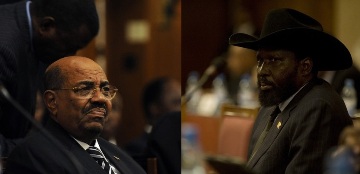Bashir-Kiir talks on oil collapse despite African pressure
January 27, 2012 (ADDIS ABABA) – The presidents of Sudan Omer Hassan al-Bashir and South Sudan Salva Kiir failed to reach an agreement on the terms by which Juba can export its oil through the north’s pipelines despite pressure mounted by African leaders present at the summit in Addis Ababa.

The landlocked South Sudan became independent last July under a 2005 peace deal that ended decades of civil war with Khartoum. It took with it about 75 percent of roughly 500,000 barrels per day of oil production.
Both countries depend heavily on oil and have put forward widely differing figures for a possible transit fee. Sudan has publicly proposed $36 per barrel, while South Sudan has listed figures under $1 per barrel.
As talks on the fees dragged on the Sudanese government said it ran out of patience and can no longer tolerate South Sudan exporting its oil for free. As such it started taking part of the oil pumped by South Sudan to make up for what it called unpaid fees.
In response, South Sudan said last week it was shutting down its output.
Zenawi along with Kenyan president Mwai Kibaki and chairman of the AU High Level Implementation Panel (AUHIP) Thabo Mbeki listened to the respective positions of Bashir and Kiir on the oil dispute after which it was realized that the gap between the two sides is very wide.
But the Ethiopian premier told the two leaders that while he respects their views but that they have no options left but to sign off on the AUHIP proposal and suggested that the mediation team ran out of ideas.
The latest proposal submitted by Mbeki’s team states that South Sudan would pay its northern neighbor $4 billion over the next five years, send 35,000 barrels per day to Khartoum’s refineries and in return the Sudanese government would release the oil tankers in Port Sudan carrying crude to their buyers.
The south countered the initiative saying it is prepared to pay only $2.6 billion over the next five years including $1 billion starting this year.
Some sources told Sudan Tribune that the AUHIP proposal was watered down in Addis Ababa today to where it allows Juba to export its oil without Khartoum seizing part of it. South Sudan would then provide Sudan with the 35,000 bpd.
The two sides would then work on the transit fee portion of the dispute and seek an agreement within three months timeframe.
After several hours of frantic deliberations Bashir and Kiir agreed to sign an accord on spot after consulting with their delegations prompting Zenawi to break the news to his African peers.
But Kiir reportedly came back and said he can’t approve of this arrangement in its present form.
The head of South Sudan negotiating team Pagan Amum vehemently denied that Kiir gave Zenawi his blessings saying that this a “lie”. He stressed that his boss never agreed and came to the summit to inform the leaders about his position and that for a starter Khartoum must return the oil it seized.
Sudan’s foreign minister Ali Karti said that Kiir’s stance generated harsh criticism from African leaders.
Zenawi said the two sides hadn’t agreed on a deal yet, but oil would stay on the agenda in Addis Ababa, where the leaders of Somalia, Kenya and Ethiopia also met.
“It was agreed that the two parties will continue their negotiations during the summit. We have not come to conclusion as yet,” he told reporters.
Zenawi said an African Union mediating panel had proposed a “reversal of unilateral measures” taken by both sides, but did not spell out what that meant. “Many of those issues are agreed, but there are some sticking points,” he said.
In a related issue the London-based al-Sharq al-Awsat newspaper reported that Bashir refused the presence of Ugandan president Yoweri Musevini in the oil talks.
(ST)
